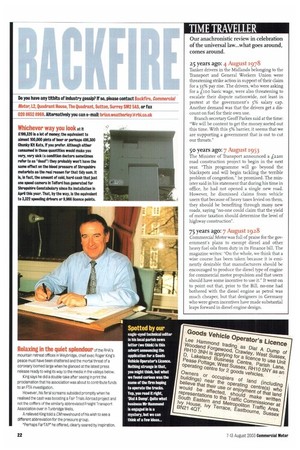TIME TRAVELLE
Page 22

If you've noticed an error in this article please click here to report it so we can fix it.
Our anachronistic review in celebration of the universal law...what goes around, comes around.
25 years ago: 4 August 1978
Tanker drivers in the Midlands belonging to the Transport and General Workers Union were threatening strike action in support of their claim for a 33% pay rise. The drivers, who were asking for a flop basic wage, were also threatening to escalate their dispute nationwide, not least in protest at the government's 5% salary cap. Another demand was that the drivers get a discount on fuel for their own use.
Branch secretary Geoff Parkes said at the time: "We will be content to get the money sorted out this time. With this 5% barrier, it seems that we are supporting a government that is out to cut our throats."
50 years ago: 7 August 1953
The Minister of Transport announced a izz.rn road construction project to begin in the next year. This programme will go beyond the blackspots and will begin tackling the terrible problem of congestion," he promised. The minister said in his statement that during his time in office, he had not opened a single new road. However, he dismissed claims from vehicle users that because of heavy taxes levied on them, they should be benefiting through many new roads, saying "no-one could claim that the yield of motor taxation should determine the level of highway construction".
75 years ago: 7 August 1928 Commercial Motor was full of praise for the government's plans to exempt diesel and other heavy fuel oils from duty in its Finance bill. The magazine writes: "On the whole, we think that a wise course has been taken because it is eminently desirable that manufacturers should be encouraged to produce the diesel type of engine for commercial motor propulsion and that users should have some incentive to use it." It went on to point out that, prior to the Bill, no-one had bothered with the diesel engine as petrol was much cheaper, but that designers in Germany who were given incentives have made substantial leaps forward in diesel engine design.
































































































































































